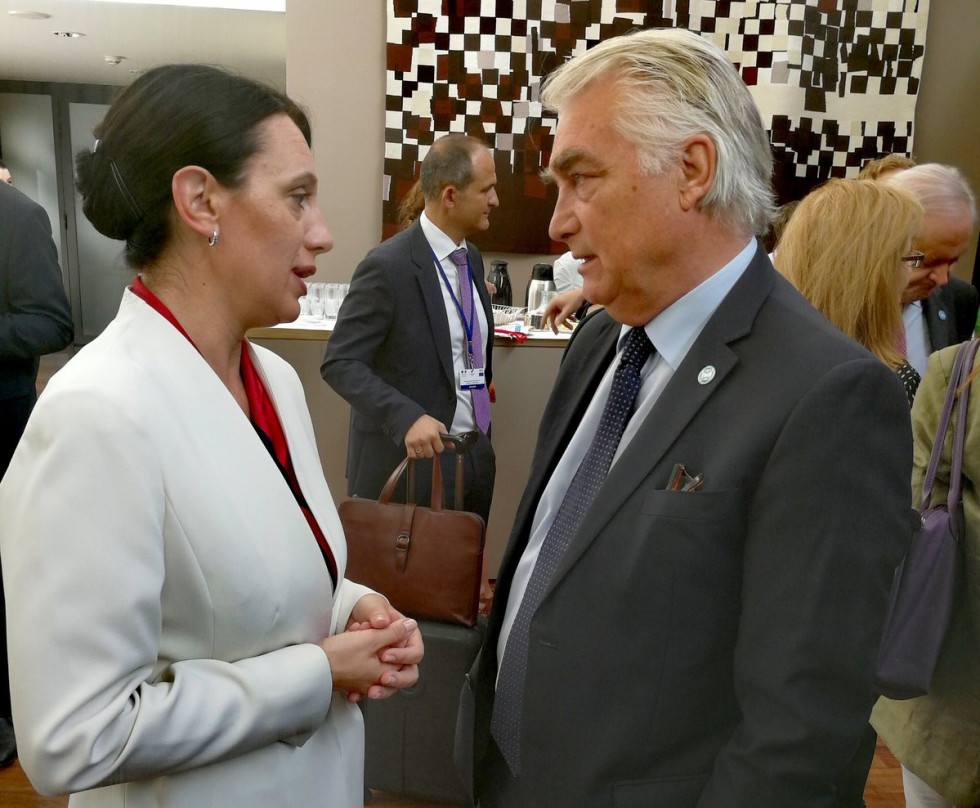Paris Informal Meeting on Migration: Focus on Cooperation and Solidarity
- Ministry of Foreign Affairs
- Government of the Republic of Slovenia

Ambassador-at-Large Andrej Logar and Nina Gregori, Executive Director of the European Asylum Support Office (EASO)
Slovenia has so far demonstrated solidarity with member states by participating in several operations and, as stated by Ambassador Logar, it remains in favour of a common European solution on migrations and opposes any unilateral moves. He advocated improvement of the Common European Asylum System and pointed out that, because the Balkan route was crucial for Slovenia, the country was most active especially in the Western Balkan region. The number of migrants on this route is increasing, as also confirmed today by the Frontex agency, even though it is not comparable to 2015 and 2016 figures.
Thirty-one Schengen and EU countries’ representatives and representatives of the European Commission, the European Asylum Support Office (EASO), Frontex, the International Organization for Migration, the African Union and the UN Agency for Refugees met to exchange opinions and improve coordination among European countries and international organisations in order to tackle migration more successfully. Even though migration figures are not comparable to 2015 and 2016, it is becoming increasingly difficult to manage migrations by sea, resulting in high death rates among migrants, especially in the central Mediterranean. The participants also expressed their concern about the situation of migrants and refugees in Libya. Frequently, their only option is to make a deal with traffickers and set out on a dangerous journey across the sea to Europe, which, however, has claimed many lives over the past months. Therefore more has to be done to identify and dismantle trafficking networks and decrease the numbers of people attempting the dangerous Mediterranean crossing. To achieve this, good coordination and cooperation among European countries and international organisations are vital.
The participants also agreed that naval missions and disembarkations need to be organised in accordance with international law and national and European regulations, whereby maintaining a just balance between responsibility and solidarity is of no less importance. In this context, Ambassador-at-Large Andrej Logar pointed out that, within its capacities, Slovenia has already demonstrated solidarity with the most affected member states by offering, as part of the relocation scheme, to receive migrants from rescue ships that landed in Malta. A Slovenian team took part in Operation Mare Nostrum with the Triglav patrol boat. Given the importance of the Balkan route for Slovenia, he emphasised that Slovenian police officers had been deployed to border crossings in North Macedonia and Serbia. Furthermore, Slovenia supports the reform of the Common European Asylum System because solidarity among countries is crucial for improving the management of migration.
Regarding the return of migrants, the participants pointed out that all EU member states, especially first-entry and disembarkation countries, need to be provided with the necessary financial and technical assistance by the EU to facilitate the swift and legal return of disembarked people who do not qualify for international or asylum protection to their countries of origin. They urged the International Organization for Migration (IOM) and European agencies, in particular the Frontex agency, to support the voluntary return of people within the scope of their powers and to provide assistance in implementing these returns. They proposed that the EU High Representative for Foreign Affairs intervene in the countries of origin to facilitate the readmission of their citizens and issue the necessary travel documents.

